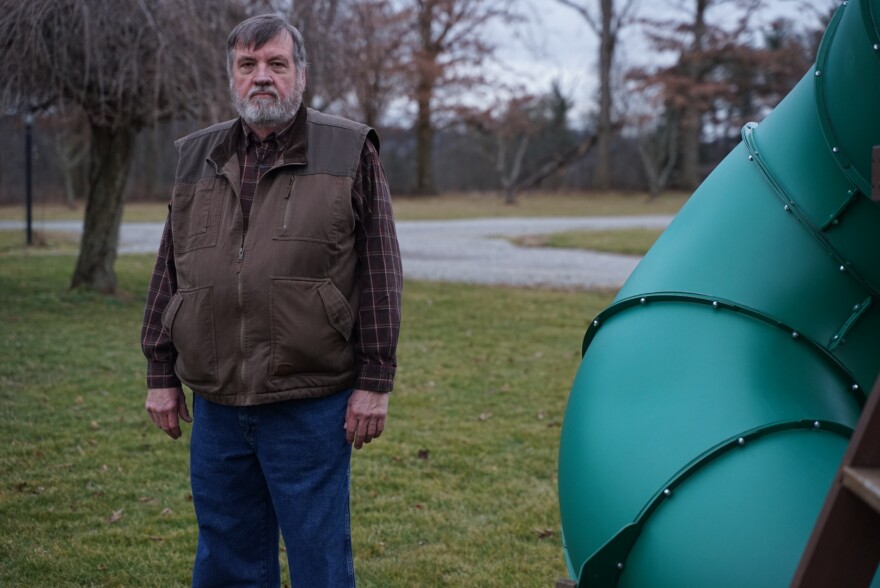Lee Hostetter lives a couple hundred yards outside the 1-mile evacuation zone from the East Palestine train derailment. His mailbox down the driveway is located within it.
Hostetter lives in Darlington Township, Pa., less than a half-mile from the Ohio border. But he said that since a Norfolk Southern train carrying toxic chemicals derailed on the Ohio side of the border on Feb. 3, the invisible line separating the two states has seemed to determine who gets help and who doesn’t.
- Some Pennsylvanians feel left behind by the crisis response to the hazardous Norfolk Southern derailment on the Ohio-Pa. border
- Several Pennsylvania politicians have sent letters to both Norfolk Southern and federal agencies
- Pennsylvania’s Department of Environmental Protection will conduct independent water sampling near the disaster on the Pennsylvania side
“Nobody in Pennsylvania seems to be cooperating with us people. We hear all kinds of stuff going on with attorneys and people in Ohio, getting information,” he said. “But here, I'm right here and don't hear nothin’. Nobody comes to see me or anything.”
That’s not to say nothing has been done. Several Pennsylvania politicians have sent letters to both Norfolk Southern and federal agencies, asking for answers on behalf of their residents, including Gov. Josh Shapiro. Shapiro’s office also helped lead an evacuation effort of residents on Feb. 6, and the governor himself met last week with several Beaver County officials to discuss the work of state agencies helping to respond to the incident.
“Over the past two weeks, the Shapiro Administration has worked closely with our local and federal partners to monitor air and water quality — and the Governor is leading the way to hold Norfolk Southern accountable for any and all impacts to Pennsylvania,” said Manuel Bonder, Shapiro’s press secretary.
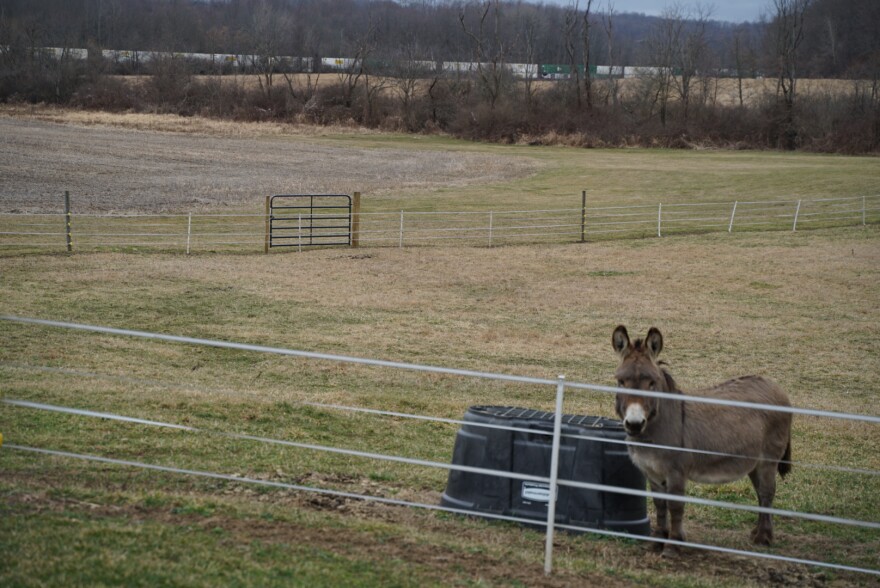
But some residents said that the work done on their behalf so far hasn’t always been made clear to them. Late last week, WESA spoke with multiple Pennsylvanians in Beaver County who live within or just beyond the evacuation area near the site of the train derailment. There are dozens more people in a similar position nearby, and they said, hundreds more Pennsylvanians who have been severely impacted.
One couple said they have been able to return home, and except for the occasional smell or debris, they don’t have major concerns. But others are worried about what the accident will mean for the land they grow crops on, the animals they hunt, the fish they eat and the long-term health of their families.
Lee Hostetter
Hostetter watched the fire from the initial crash, on Friday, Feb. 3, rise above the tree line of his 425-acre farm in Darlington Township. At first, he wasn’t worried because the wind was blowing smoke towards the southeast and he was located northeast of the accident. But the next day, he said, the smoke started blowing through his yard, so he and his family evacuated.
By the following Monday, Hostetter was back home, where he planned to stay despite Norfolk Southern’s plans to vent chemical gas from some of the rail cars; it was a necessary precaution, the railroad said, to prevent a more dangerous explosion. But Hostetter’s house sat outside the evacuation zone that public officials had designated, so he said he believed he and his family were safe. He was shocked to see a black mushroom cloud that he likened to that of a nuclear bomb. “I ain't staying here with that,” he said to his family. “Let's get out of here.”
He drove to a hill to try to see where the wind was blowing, but he couldn’t tell which direction the black cloud was heading.
“It was going everywhere,” he said. “It wasn't just going in one direction, it was going this way. It was going to Ohio and down towards Darlington.”
So they fled nearly 15 miles to Columbiana, Ohio, for the evening but returned home that night. “The next morning I got up, and boy, you could smell it and everything really bad,” he said.
He’s worried about their 250 acres of cropland, their cattle and fish. He found a couple of dead fish in his pond, which he said was unusual, although hundreds of other fish have survived.
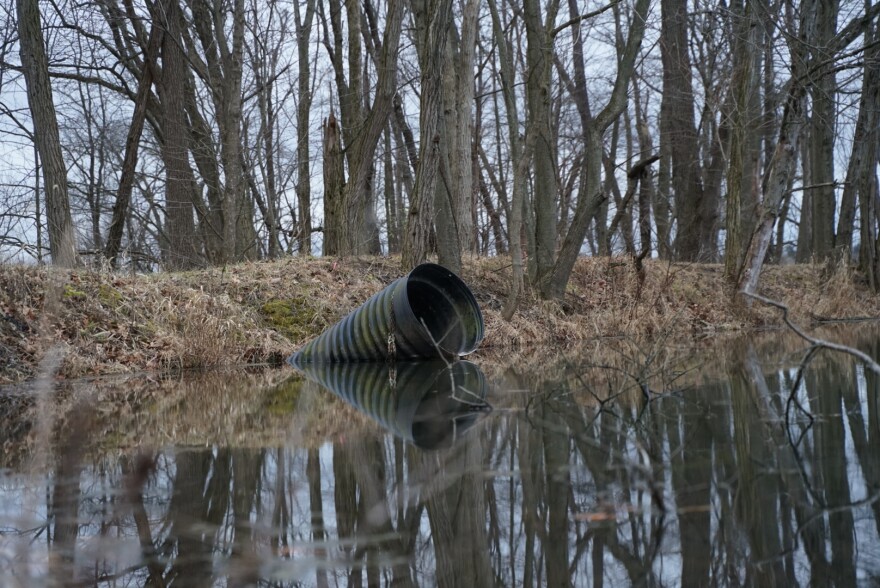
Hostetter said his biggest worry, though, is for his family’s health; most of his immediate family live within eyeshot of his house. “I got my granddaughter here and my daughter and my son,” he said. “If I knew it was going to be this bad, we'd have been gone for a week.”
But because they were on the edge of the evacuation zone, the decision was left up to him.
“Nobody official came to see me to say anything. I'm just hearing stuff from other people and that,” he said. “So, I was originally told we should stay in place, and that's what we've been doing. And then I didn't realize there's all these chemicals.”
He believes some of the water near his property should be tested and worries about his family potentially having long-term health effects. His daughter requested to have the air inside their homes tested, but Hostetter said the men who did the testing worked for Norfolk Southern, and he doesn’t trust the results that said the air was safe.
“We need more help here to understand what's going on,” he said. “And they haven't come here and tested the soil, the water or anything in Pennsylvania that I know of.”
Adam Cornwell
Around the time of the accident on Feb. 3, Adam Cornwell said his whole house started shaking. Cornwell lives on North State Line Road, which runs parallel to the Ohio border about 500 feet away, and about a mile as the crow flies from the derailment site. He walked to the top of the closest hill and saw what, to him, looked like the whole town of East Palestine on fire and then waves of smoke coming down the road toward his house.
The East Darlington Fire Department didn’t come by to evacuate his home until two days later, when Norfolk Southern planned to release toxic chemicals from five cars into the atmosphere. Cornwell couldn’t sleep all week. He’d lost all of his belongings in a house fire in East Palestine five years ago and said he was worried it was going to happen again.
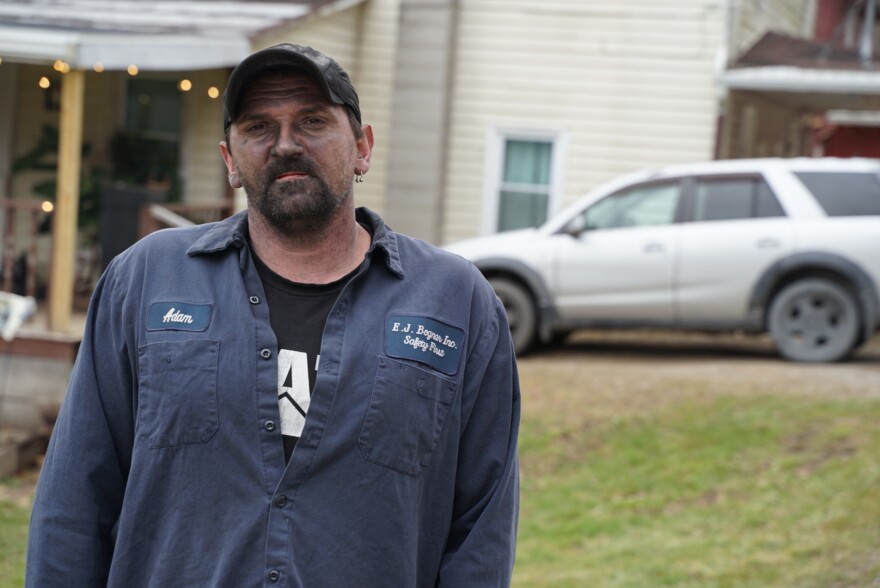
When he returned home three days later, the air outside smelled of burning rubber and sulfur, and his fiance cleaned slimy, yellow residue off the walls and counter.
Cornwell said he was surprised to find that his chickens seem to be doing fine, and he doesn’t believe the creek that runs behind his house was contaminated. But he’s worried about reports of dead animals in the area and doesn’t think he’ll be able to hunt nearby anymore.
“I don't want to eat the deer if they're breathing in that contaminant,” he said.
“We're in a different world out here. They're leaving us out. And this is serious. We want to know how bad it really is.”Lee Hostetter
Sue and Ed Tobias
Sue and Ed Tobias, both in their 80s, live on a 95-acre farm on East Palestine Road — in Pennsylvania — about 2 miles from the accident. Sue had seen the glow in the distance, but she said they weren’t told to evacuate from their home until Monday, between 12:30 p.m. and 1 p.m. Less than an hour later, Pennsylvania Gov. Josh Shapiro had held a press conference warning people like them, who lived in the projected path of the toxic chemical plume, that they had a few hours to leave or their lives would be in jeopardy.
“Let me be very, very clear: If you are in this red zone that is on the map and you refuse to evacuate, you are risking death,” Shapiro said. “This is very serious. If you are within the orange area on this map, you risk permanent lung damage within a matter of hours or days.”
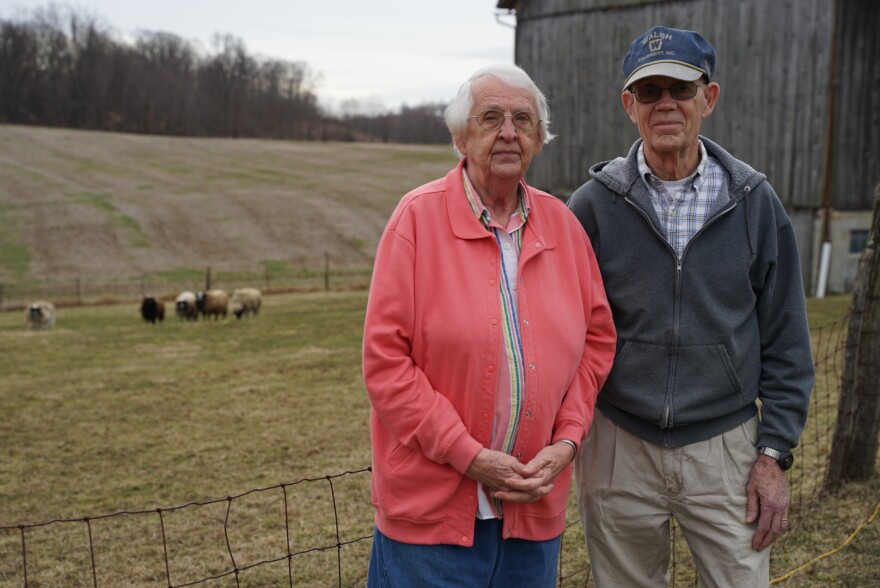
Two women from the local fire department were the first to stop by to tell the Tobiases to evacuate. Then two separate state troopers stopped by soon after, as Ed was feeding their five sheep before they left. Their family has owned the farmland there since at least the late 1700s, they said.
“We weren't too concerned about it,” Sue said. “They didn't tell us we had to go out, but they strongly recommended it.”
When they returned home the next day, after receiving an all-clear from Beaver County Emergency Management, they said they didn’t see any smoke or smell any odor. Ed has been collecting little flakes of what appear to be burned paint from the rail cars that have floated onto their property. But the sheep and cats all appeared fine. They told the man who farms their land that they hadn’t found any issues.
Part of her lack of worry, Sue said, is because of their age. “The people are concerned about 20 years down the road — I'm not going to be here 20 years down the road.”
But their daughter lives south of East Palestine, next to Leslie Run, a stream in which dead fish reportedly have turned up since the derailment. There was a chemical odor emanating from the creek, Sue said, but her daughter decided to stay home because she was located outside the plume zone. But her daughter is planning on having the well water tested soon.
For her part, Sue isn’t worried about her own well; she said they already have three kinds of treatment and filtration on their well water.
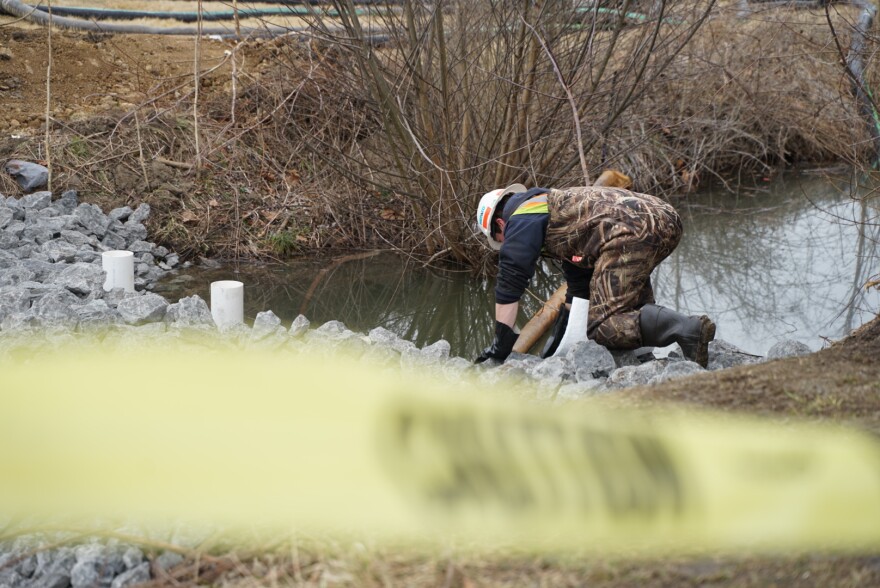
A main road out of East Palestine has been closed, so now they’ll often see five or six cars passing at a time, whereas in the past they would be lucky to look out their window and see one.
“Our biggest problem right now is traffic, because we're the main exit from East Palestine going this direction [south],” Sue said.
Response
In response to the concerns raised by these residents, Norfolk Southern responded to WESA in a short emailed statement: “Any Pennsylvania resident impacted by the evacuation is able to come to the Family Assistance Center for reimbursements for any expenses. If they were within the mandatory evacuation zone, they are eligible for the $1,000 payment.”
Last week, Shapiro announced that Pennsylvania’s Department of Environmental Protection will conduct independent water sampling near the disaster on the Pennsylvania side.
U.S. Rep. Chris Deluzio, whose congressional district in Pennsylvania includes many of these nearby residents, visited East Palestine last week and met with representatives from the U.S. Environmental Protection Agency to better understand how the recovery work is happening. He said he’s been receiving calls from worried constituents across his district.
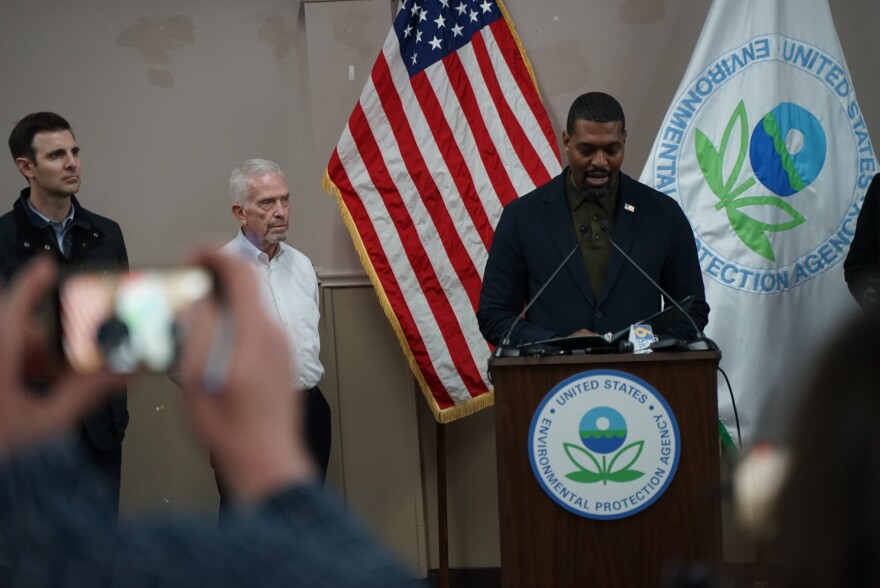
“So this is the first phase of making sure folks feel and are safe. And the other part of this is to make sure that this railroad is held accountable,” he said. “That's not going to happen overnight.”
Still, several Pennsylvania residents near the derailment said they feel as though Norfolk Southern and public officials at all levels could be doing more to provide them with help.
“Nobody from Pennsylvania, as far as the government or anything, has come out here that I know of,” Hostetter said. “We're in a different world out here. They're leaving us out. And this is serious. We want to know how bad it really is.”

